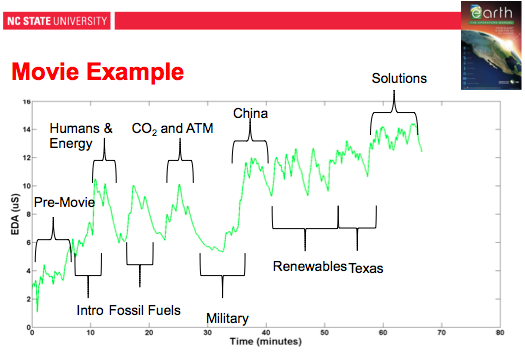As any teacher will attest, engaging a learner, getting them immersed in their own learning, is often half the battle. Climate change poses a particular challenge in this regard.
The topic is daunting and can be overwhelming, depressing, and in some circles controversial. A lecture can be deadly dry and technical. A discussion can devolve into debating uninformed opinions. Movies are often a static and unengaging way to convey information. And self-reflection—which can provide a introspective dimension to engaged learning—is often missing all together from science classroom discussions of the topic.
In a creative and novel approach to assessing the effectiveness of different approaches to climate change education, Dr. Karen McNeal of North Carolina State explored the potential for combining the use of lecture, dialogue, movies, and self-reflection in an undergraduate course on climate change. As a means of scientifically tracking the engagment level of the students as they listened to lectures, participated in discussions, and watched a movie, she measured the EDA, or Electrodermal Activity of some of her students.
EDA measures skin conductance, which provides a window into the emotional response or engagement of the student. The technique is non-invasive, using a low constant voltage to skin to capture real time responses to stimulus, which in turn trigger sympathetic nervous system responses that can be measured in changes of skin conductiveness.
Below is a figure from McNeal's presentation at the Geological Society of America conference about her recent finding. It shows one individual's response to watching Earth: The Operators' Manual, or ETOM for short, a NOVA television program that features climatologist Richard "Ring of Fire" Alley and was produced by Geoffrey Haines-Stiles, who was the producer of the original Cosmos series with Carl Sagan.
Figure courtesy of Karen McNeal
ETOM is an informative and entertaining documentary (and supporting website and book) that walks through the basic science connecting the burning of fossil fuels and related activites to an altered climate system, demonstrating how scientists know through a process of elimination and looking at carbon isotopes that humans are the cause of recent warming trends.
It drills into examples of what the military, China, and wind farmers in Texas are doing to move away from fossil fuels and toward renewable sources of energy. The program culminates in a rousing call to inform ourselves about the causes, effects, risks, and responses to climate change.
In an email, Dr. McNeal wrote:
The peaks and valleys seem to correspond nicely to the changes in ETOM topics...I have several other student examples that show similar responses. The ETOM…had significantly higher EDA responses for students than dialogue or lecture activities. Also, the slow upward slope to the line seems to indicate a building of engagement as the movie continues, indicating a peak at the solutions presentation at the end of the movie.
In other words, the EDA of ETOM was through the roof.
McNeal is writing up her findings over the coming weeks for a journal article, so stay tuned for the official results. But the "cut to the chase" conclusion of her research is that, yes, increased engagement is a plus, and weaving together the three pedagogical approaches with self-reflection through journaling, show promise in helping address the substantial cognitive gaps, confusion, doubt and denial that exist in our society today about climate change.
